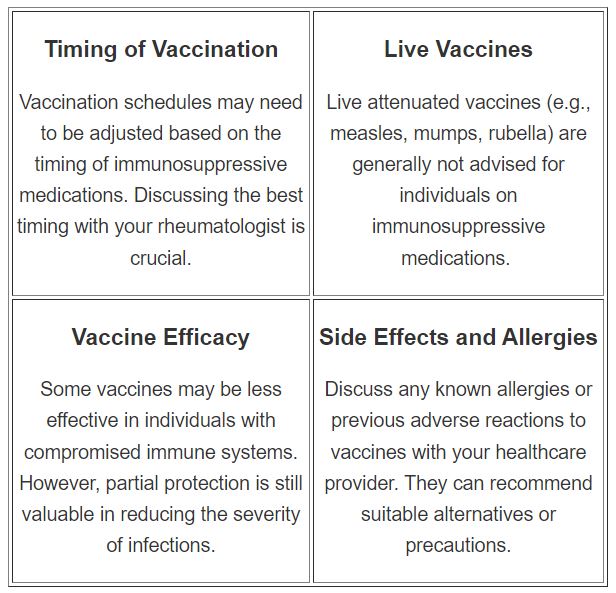
Autoimmune rheumatic diseases are characterized by an overactive immune system. Living with it means facing many challenges, one of which is the heightened vulnerability to infections. Infection is a major cause of morbidity and mortality in patients with autoimmune rheumatic diseases.
Why is Vaccination Crucial for Rheumatic Disease Patients?
Autoimmune inflammatory rheumatic diseases can significantly weaken the immune system. A balanced immune system wards off foreign invaders, but when it goes haywire, it mistakenly attacks the body's cells, leading to inflammation and damage. It also becomes less efficient in fighting off infections.
Consequently, patients with rheumatoid arthritis, lupus, or spondylitis are more susceptible to several infections. The increased vulnerability stems from the auto-immune disease and the medications used in their treatment. While excellent at controlling inflammation and preventing disease progression, many of these medications can compromise the immune system.
Invasive Pneumococcal Infection, Influenza, Herpes Zoster, and Hepatitis B and C are major vaccine-preventable diseases. Some of these infections can be potentially severe but are preventable through vaccination. This shows the importance of preventive measures, and vaccination is at the forefront of these measures. Thus, patients who are required to receive anti-rheumatic drugs are provided with vaccinations to boost the immune system against those specific organisms.
Consult our rheumatology hospital in Bangalore if you require vaccination for autoimmune rheumatic diseases.
Vaccinations Before Initiating Treatment of Autoimmune Rheumatic Disease
1. Influenza (flu) Vaccine
The seasonal flu can significantly threaten individuals with autoimmune diseases. The flu vaccine is recommended annually for most patients. It's important to receive the inactivated (killed) flu vaccine rather than the live attenuated version, as it may not be advised for those on certain medications.
2. Pneumococcal Vaccines
There are two primary types to be aware of:
-
PCV 13 (Pneumococcal Conjugate Vaccine)
Administered once in a lifetime, it protects against 13 strains of pneumococcal bacteria.
-
PPSV 23 (Pneumococcal polysaccharide vaccine)
After the first, PPSV necessitates a booster shot after five years and again at age 65. It expands protection against an additional 23 strains of the bacteria.
3. Herpes Zoster Vaccine
Herpes zoster or shingles, can be incredibly painful and even more so for those with compromised immune systems. The vaccine typically consists of two doses (one at day 0 and the other after 2 months interval). It is given to young women if they are about to start anti-inflammatory medications, particularly tofacitinib, but ideally recommended for individuals over the age of 50.
4. Hepatitis B Vaccine
Hepatitis B can lead to chronic disease and long-term liver damage. Healthcare workers, given their frequent exposure, are at heightened risk. They must seek vaccination guidance, ideally from infectious disease specialists or rheumatologists, to ensure they're adequately protected.
When to Vaccinate for Patients with Anti-Rheumatic Diseases?
While vaccination is essential, the timing can be equally crucial. It's recommended that vaccines be administered ideally two weeks before starting rheumatic drugs. This window allows the immune system to build an adequate response to the vaccine before potentially being suppressed by the medications.
Considerations & Precautions for Autoimmune Rheumatic Disease Patients

Living with an autoimmune rheumatic disease can be challenging, but infection risks can be mitigated. Vaccination offers a shield, a layer of protection against potentially severe infections. It embodies the proverb - "Prevention is better than cure".
Book an appointment at Manipal Hospital Jayanagar with a leading rheumatologist in Bangalore for all your rheumatic conditions.
FAQs
1. Is vaccination safe for individuals with autoimmune rheumatic diseases who are on immunosuppressive medications?
Yes, vaccination is generally safe and crucial for individuals with autoimmune rheumatic diseases. You can visit Manipal Hospital Jayanagar, and seek consultation with an acclaimed rheumatologist in Bangalore. They’ll help you determine the best vaccines and timing based on the patient's specific medications and disease status.
2. What are the common infections that can affect patients with autoimmune diseases?
Invasive Pneumococcal Infection, Influenza, Herpes Zoster, and Hepatitis B and C are major infections that may prove vulnerable to autoimmune rheumatic disease patients.
3. Is vaccination mandatory for all patients before beginning anti-rheumatic drugs?
Ideally yes, vaccination is an important step for these patients as it helps boost the immune system against infections.



















 5 Min Read
5 Min Read















